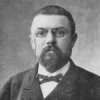Henri Poincare

Henri Poincare
Jules Henri Poincaréwas a French mathematician, theoretical physicist, engineer, and a philosopher of science. He is often described as a polymath, and in mathematics as The Last Universalist by Eric Temple Bell, since he excelled in all fields of the discipline as it existed during his lifetime...
NationalityFrench
ProfessionMathematician
Date of Birth29 April 1854
CountryFrance
believe independent reality
This harmony that human intelligence believes it discovers in nature - does it exist apart from that intelligence? No, without doubt, a reality completely independent of the spirit which conceives it, sees it or feels it, is an impossibility. A world so exterior as that, even if it existed, would be forever inaccessible to us. But what we call objective reality is, in the last analysis, that which is common to several thinking beings, and could be common to all; this common part, we will see, can be nothing but the harmony expressed by mathematical laws.
reality views giving
When the logician has resolved each demonstration into a host of elementary operations, all of them correct, he will not yet be in possession of the whole reality, that indefinable something that constitutes the unity ... Now pure logic cannot give us this view of the whole; it is to intuition that we must look for it.
eye reality games
So is not mathematical analysis then not just a vain game of the mind? To the physicist it can only give a convenient language; but isn't that a mediocre service, which after all we could have done without; and, it is not even to be feared that this artificial language be a veil, interposed between reality and the physicist's eye? Far from that, without this language most of the initimate analogies of things would forever have remained unknown to us; and we would never have had knowledge of the internal harmony of the world, which is, as we shall see, the only true objective reality.
independent science reality
A reality completely independent of the spirit that conceives it, sees it, or feels it, is an impossibility. A world so external as that, even if it existed, would be forever inaccessible to us.
means necessary neither nor
Thus, be it understood, to demonstrate a theorem, it is neither necessary nor even advantageous to know what it means . . . .
american-journalist relations remain replace
Thus, they are free to replace some objects by others so long as the relations remain unchanged.
american-journalist
No more than these machines need the mathematician know what he does.
american-journalist governed phenomenon succeeding
If that enabled us to predict the succeeding situation with the same approximation, that is all we require, and we should say that the phenomenon had been predicted, that it is governed by the laws.
avoiding consists infinite invention useful useless
Invention consists in avoiding the constructing of useless contraptions and in constructing the useful combinations which are in infinite minority. To invent is to discern, to choose.
american-journalist cannot cause determines due effect escapes notice
A very small cause which escapes our notice determines a considerable effect that we cannot fail to see, and then we say that the effect is due to chance.
american-journalist believe both convenient equally necessity
To doubt everything, or, to believe everything, are two equally convenient solutions; both dispense with the necessity of reflection.
american-journalist species
It has adopted the geometry most advantageous to the species or, in other words, the most convenient.
wish different looks
If one looks at the different problems of the integral calculus which arise naturally when one wishes to go deep into the different parts of physics, it is impossible not to be struck by the analogies existing.
effort difficulty
But all of my efforts served only to make me better acquainted with the difficulty, which in itself was something.